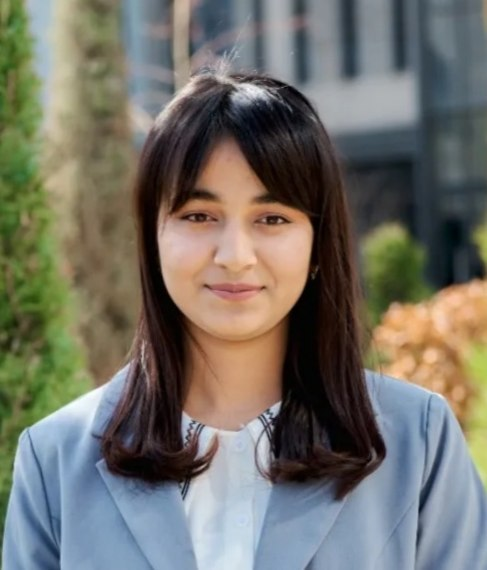
MURDERER OF FATHER
or the state of uneducated teenagers
(a lesson from an enjoyable life in Turkistan)
Makhmudkhoja Bekhbudi
Translated by Nafisa Abralova
Three act, four scenes. Initial Uzbek nation tragedy
Characters (dramatic personae):
A Rich Man – 50 years old
Tashmurad – the Rich Man’s son, 15-17 years old
An Imam – instructor at a Muslim school or religious figure with new perspective
An elite person – (with clothes of Europe), studied in the Russian language
Khairullo – clerk and guard of the Rich – 18-20 years old
Tangriqul – killer of the Rich
Davlat and Nor – (virgin children) – need approximately four sum to their pockets
Liza – Russian woman, in role of foul
Artun – Armenian man who owns the drunk-house
Pristuf – including two policemen, two guards, three neighbors of the Rich Man
Boybuchcha – wife of the Rich Man – 35-40 years old
Necessary things:
A serving tray of sweets, bread, table-cloth.
A tea-pot, a tea-bowl, kalian.
A carpet, a quilt, a pillow to the hotel.
A bed.
A stick.
Ten bottles of water and kvass.
Five-six glasses.
A trunk.
A purse with something like money.
A big knife.
A pistol.
A iron tool to open the trunk.
The perfect clothes of policemen, two guards the sticks.
Act 1. Scene 1.
A hotel. The Rich is sitting with Khairullo.
Imam (enters): Assalomu alaykum.
Rich: Va alaykum assalom. Welcome to there. (He stands up and shows place to the Imam and sits again)
Imam: May Allah increase your wealth even more. (He prays)
Rich: May your prays be accepted, In sha Allah.
Imam: Of course, night of Jumma is right time to the preys be accepted.
Rich: Thank you, Imam.
Imam: You are welcome.
Rich: Khairullo! Bring tea and the serving tray!
Khairullo: It will be fine. (He brings tea and the serving tray with sweets, he pours tea and they drink)
Tashmurad enters rudely without greeting.
Tashmurad: Dad, I am going to the cinema, give me money!
Rich: Who are you going with?
Tashmurad: With my friend named Tursun.
Rich: Ok, come early and don’t go to a bad place. (He gives money from his pocket)
Tashmurad: Ok, ok, you talk too much.
Imam looks at the Rich and Tashmurad and he lowers his head.
Rich: What’s up, Imam?
Imam: Well, your son has become a big boy, may God give him long life. Does he study in the new method school or in the old one?
Rich: Not both.
Imam: Do you homeschool him?
Rich: No, no, I do not think about teaching him!
Imam: I wonder why you do not teach him? Indeed, our study is both a condition and a debt, knowledge is the honor of the world and the hereafter.
Rich: In my mind, the honor of the world is wealth. As for the hereafter, there will be a destiny written by Allah. For example, we see that people respect the rich more than the learned. There are also more banks, and if someone wants to get a loan from the bank, they take the rich people like us as guarantors. Banks do not give money to people who do not have a guarantor, that is why everyone respects us a lot.
Imam: These words of yours are acceptable in the present time, but the values and respect of the guarantors and the rich are temporary, until the people come to their senses. Because they only respect you when they come with work. And the whole nation really respects scientists and intellectuals.
Rich: No, they really respect us too. Even Russians and Armenians respect us.
Imam: Okay, let’s put respect aside. If you teach your son, he will help you with your calculations, he will learn well about prayer and Islam, and it will also be a reward for you.
Rich: It is not difficult to be a clerk. I give Khairullo seven sums every month, he works as a secretary during the day, does hotel work at night, and even reads books until I fall asleep.
Imam: It is good, but you must educate your son in Sharia and religion.
Rich: It is good, but you must educate your son in Sharia and religion. My wealth alone is enough for him.
Imam: What do you say about the conditions of Islam, Namaz..?
Rich: I know the prayers for Namaz five times, I will teach him myself.
Imam: Then what about writing and literacy? However, an illiterate person is useless.
Rich: Your opinion is strange, because I am also illiterate, but I am one of the richest people in our city and I know everything.
Imam: You were practically rich in the past, but that is no longer possible. Even for daily living, knowledge is needed. As you know, for twenty to thirty years our trade has passed into the hands of Armenians and Jews and other foreigners. The reason for this is that we are not educated. In addition, we see uneducated children who ruin their father’s property and end up being humiliated-he becomes a bully. Therefore, I suggest you educate your son in school.
Rich: Hey Imam, are you criticizing me? Son is mine, wealth is mine, what is yours? One of those who read is you, but you don’t even have bread to eat. Again you advise me. Khairullo, lock the hotel, I want to sleep.
Imam (looks people): We also need money to study and become mullahs. And such is the case of our wealthy people. So with this departure, the world and the hereafter will be disgraced. Reading was the same assumption to everyone: men and women. Eh Rich, I made advice to you and fulfilled the duty on my neck. We will see your son’s condition when he is an older child, and you will still regret that you did not teach him.
Rich: Hey Imam, I don’t need an Admonisher. (depending on the people). This man distracted me from my work, from my sleep. Khairullo, lock the hotel.
Imam goes out in a row. Rich man sits nervously.
An elite person: Assalamu alaikum.
Rich: Vaalaikum assalam. Khairullo, bring a chair. This person cannot sit on the ground.
Khairullo brought the chair. The elite person sat down and smoked.
The elite person: Mr Rich, you don’t seem to be in a good mood, may I know why?
Rich: An Imam came, “Why aren’t you teaching your son?” said. I barely escaped chasing him. We almost got into a fight.
The elite person: Yeah, yeah, it was a very interesting event. (Looking at people) There is also a mullah in this city who commands the rich. Alhamdullilah. I need to find that Imam. Ziyoli. Ah-ha, interesting and intriguing event indeed (referring to people), there is a well-known and respected mullah in this city who guides the people. Thank God, I found the true path and now I must visit the southern holy shrines. Boy, sir, may your words never fail, I also wanted to speak a few words to you for a long time. But now is not the right time, so please give me a few minutes of your attention so that I can talk about beneficial knowledge.
Rich (looking at him): Now I understand, you also consider me as someone who teaches children (referring to people). Today I am sitting on my left side thinking about unexpected matters, let’s put aside these thoughts and go towards our destination. Goodbye! Bring my pipe! (Both remain silent, the pipe arrives. Boy lights it up).
Rich: Goodbye!
Khairullo: Excuse me!
Rich: Take care of my place, I need to sleep (yawns), there will be a lot of work tomorrow and I need rest (yawns again).
Khairullo: Alright then.
Elite person (seriously): Rich, sir! I told you that I wanted to talk about necessary knowledge for the nation but it seems like you are not interested in listening to my words. For the second time, please listen to me for a few minutes so that I can talk about beneficial knowledge for you and the nation.
Rich: Do you want to force and burden me with your words? And why did you come here? To punish me?
Elite person: No, I came here for another reason but got distracted by the discussion of knowledge. So let me change the subject and explain about knowledge properly to you. Maybe young boys like you should be taught religious subjects.
Rich (looking at the people): Well, it seems like there are not enough mullah stories. Okay, my dear friend, do not be disappointed, finish your talk tomorrow. I am sleepy now (yawns), go and teach the children.
Elite person: This is a new and different era. In this era, without knowledge and skills, the people’s dignity, land, and property will gradually disappear. Even morality and culture will deteriorate, and even religion will become weak. That is why it is necessary for us to teach Muslims, especially in this era there are two types of scholars: one is religious scholars; the other is contemporary scholars. Religious scholars include imams, preachers, teachers, religious judges, muftis who manage the religious and moral affairs of the common people. These students should first study scientific and religious subjects in Turkistan and Bukhara, then go to Mecca, Medina, Egypt and Istanbul to complete their religious studies or become competent clerics (Boy listens attentively). Do you understand boy?
Rich (raising his head): Yes, yes, tell me more.
Elite person: To become a contemporary scholar, children should first learn Islamic reading and writing as well as their native language after studying at madrasas (religious schools) or schools under the government’s system. After completing their education at gymnasiums (high schools) and city schools they should be sent to universities in St. Petersburg or Moscow to study medicine, agriculture engineering , law , fine arts , economics , philosophy , teaching profession , etc . They should actively participate in Russian society and state affairs and reach high positions in the government . If they contribute to the welfare of our nation according to our current needs as well as serve Islam by becoming partners of the Russian state even if they become partners of the Russian state , send Muslim children who have studied this way to educational institutions in Farangistan (Europe), America or Istanbul for further education . Our beloved prophet said: If knowledge is found even in China, seek it out, isn’t that right? (Boy falls asleep) These things are not possible without money but with the support of great people like you, wealthy Muslims from the Caucasus, Orenburg and Kazan spend a lot of money on educational programs and teach disabled children. Of course, you probably didn’t understand what I said, southern boy. Boy, ah!
Rich (smiling, raising his head proudly): Yes, yes…
Elite person: Oh, let me tell you something about the bad habit of our Turkistan people. If someone learns Russian and gets a job in government service wearing an official uniform, they make fun of him. If he becomes a spy or a black market worker and wears old clothes of Europeans or the clothes of gamblers, nobody says anything. They think that this is normal and ignorance of the world. Isn’t that right, boy?
Rich (lying on his side): Xur, xur, xurra, xurra, xurra…
Elite person: Oh my god! May God’s mercy be upon the Islamic ummah, especially us Turkistanis! (Leaves with tears in his eyes).
Curtain falls.
SECOND SCENE
Scene in a tavern: a boy and three men are lying dead.
TANGRIQUL: I don’t understand why I don’t feel drunk even though I drank so much. I’ve been drinking for days and my ears haven’t turned red. Fill it up with more wine! (Fills their cups).
ALL: Cheers to Toshmurod the boy! Cheers! Cheers! (They drink).
DAVLAT: Let’s go. I drank Manuv’s wine and now Liza came to my mind. Oh Liza!
ALL: Oh Liza, where are you?
NOR: The cruel fate has separated me from my beloved; if only she could come back.
DAVLAT: This is all nonsense. Let’s call the fortune teller and try to bring our father back from the grave.
NOR: Give me your hand, you nomad, if you want to find something (grabs his hand). Done.
DAVLAT: Hey Tangriqul who believes everything you say. You’re lying to everyone. Go and drink. It’s your turn, it’s my turn. Talk and lie down. Or don’t you want to make these people feel bad? We all have a five tenge coin in our pockets. Go on! Open the door and lie down.
TANGRIQUL: Let’s go. We don’t hide anything from you. If I tell the truth, I drank Manu’s wine and my ear turned red, you said it was Liza, now even if I become like this myself, my mind is on Liza and if you don’t bring Liza, you won’t be able to talk to me. But since you brought it up, Davlat, do it!
DAVLAT: Don’t worry about it, if Liza is here, you will see her soon, won’t you? I’ll take your head.
NOR: Boy! Do you have water for washing?
TOSHMUROD: Yes, sir. Let me bring some water for washing.
TANGRIQUL: You talk so much and waste time with meaningless words. If only you were as fast as your words. Hurry up and wash me (Davlat starts shouting loudly). Next!
ARTUN: What’s going on?
DAVLAT: Send someone to call Liza.
ARTUN: Why?
DAVLAT: Yes, didn’t she say that she won’t come until she gets fifteen thousand tenge? Give her fifteen thousand tenge and also pay for the taxi fare. I’ll send Nikolay over there. If there is no Liza, bring someone else, what do you care?
TANGRIQUL: Artun! Wait a minute, we’ll give you the money.
ARTUN: Really? Then give it to me now so that I know that Liza won’t come without money. Yes, give me fifteen thousand tenge and a little extra. I’ll bring back Nikolay. If there is no Liza, we’ll have fun with someone else, right?
DAVLAT: First bring her here, then I’ll give you the money.
ARTUN: Alright, I’m ready (leaves. They all start enjoying themselves and remain silent).
DAVLAT: Pour the wine! (Nor pours it for them).
TANGRIQUL: Asking for money right away made him sober up.
DAVLAT: If it’s the opposite of work, it will be like this. If you have money, bring it out. Bring out your money carriers (they all bring out their wallets, but Davlat doesn’t have enough). There is nothing here. We need to find a solution.
NOR (mockingly): Hey boy, we are poor cripples. If you tell us what you want from us, we won’t have any money left? Look at the palm of the boy’s hand (shows his hand).
DAVLAT: Don’t worry about that. Nor. I thought of something if the boy agrees.
TANGRIQUL: What is it? What?
DAVLAT: Wait, you know
TASHMUROD. Brother Tangriqul, are you going?
TANGRIQUL: I will go to the other world if the gods order. It’s your yard.
DAVLAT: What do you say, Nor?
LIGHT: I will also go if you say you have one of many.
STATE: No, just two. Don’t be suspicious of those who saw it. Today is tomorrow.
NOR: Little boy! Do you know the location of your father’s coffin?
TASHMUROD: In my father’s dormitory.
DAVLAT: How many doors does the dormitory have?
TASHMUROD: Three.
DAVLAT: Which door do you enter?
TASHMUROD. One of the doors opens from my mother’s house, I enter and open the door on the side of the yard, and then my brother Tangriqul enters.
DAVLAT: Blessings! Looks like you’ve stolen before. No! Fill up, let’s drink! (Fills the light and drinks. Looking at Tangrikul and Tashmurad) Are you going now?
TANGRIQUL: Of course. What is the matter?
DAVLAT: (looking at the two). Farewell, heroes?
TANGRIQUL: Olgani (the State takes aside Tangriqul, hints and secretly gives information and commands).
NOR: Amen, Allah… (All) Allahu akbar. (The state gives blessings).
The curtain is drawn
THIRD ACT
As usual, the rich man was sleeping on the bed, and we put the house on one side. Tashmurad gently enters through one door, looking this way and that, opens another door and stands aside. Tangrikul enters with a key and an iron tool in his hand, a knife on his waist, he goes to the chest and puts the key, but the chest does not open. He looks at Tashmurad. He gestures and asks for advice. Tashmurad ordered to break the chest with an iron tool. Tangriqul breaks the chest with an iron tool. Rich wakes up with the sound of a box. The rich man was frightened, took the club and ran to Tangriqul saying, “Oh, oh, oh, oh.” Tashmurad grabs the club. Tangrikul stabbed his neck in his armpit with a knife.
RICH (falls apart): Wow, my dear (sighing, grunting. Tangrikul takes a bag of coins from the chest, hides a knife and an iron tool, the sound of several people can be heard from outside).
PEOPLE. What’s up, someone said dod? (They enter a rich woman with several men, they see Tangriqul and Tashmurod).
TANGRIQUL: Tashmurad, horse! (Tashmurad shoots a pistol in the air and now shows the weapons to the people and runs away).
BOYVUCHCHA: Alas, from the hand of the oppressor! What a day it was, wow dod! (He claps his hands, throws himself on the rich man, tears his face and hair). Hey, young man Tashmurad! Bloody bird! If only you had smallpox! Oh dear! Tashmurad! Whoa, dod-ey!
IMAM(enters): Mother, you have no choice but to be patient. The cause of this misfortune and calamity is ignorance and ignorance, absurdity and lack of education. Ignorance has ruined your house. Beilm will send your son to Siberia. The scourge of neglecting your dear child will take its life away from you. Your child was not raised or educated by his father. In the end, you got into trouble, bad wives led you astray, and you became a victim of ignorance.
BOYVUCHCHA (excited): Oh, wow, baby! Oh, my dear, oh, oh, wow!
IMAM: Boyingiz didn’t listen to the advice and finally this bad incident appeared. Andy, you really have no choice but to be patient, Mom. May Allah give you patience.
BOYVUCHCHA (perfect impatience makes the snake sigh). Dod, oh oy! Oh my rich! I lost both of them, they will send my husband to the grave and my child to Siberia! Wow, wow, wow!
FOURTH SCENE
(Same as the second one, tavern)
No, Davlat kills by drinking and singing. Tangriqul and Tashmurad sneaked in, hid the pistol and the bloody knife aside, took out the wallet and threw it on the table; they kill.
TANGRIQUL: Bring my chili!
Artun brings chili, checks. Artun leaves. Tangriqul takes DAVLAT to one side, talks about confidential matters, and makes hints. Davlat placates the “poor” with a hint.
TANGRIQUL (opening the wallet, drinking water, patting Tangriqul and Tashmurod on his shoulder). Excellent, excellent (Government rings, Artun enters).
ARTHUN: Do you order?
DAVLAT: Ma, take the money, hurry and bring Lizann!
ARTHUN: Headrest. He comes now (they take the money, they drink. Liza enters).
LISA: Good evening! (everyone will see).
DAVLAT: Thank you, thank you, thank you, thank you…
LISA: Mercy (killer).
DAVLAT: Pour , to Lisa’s health.
NOR (spouring, squatting). Cheers to Lisa’s health (drinks).
Nor sings, whistles are heard from outside, footsteps are heard. People at the meeting will be confused and surprised. Armed policemen, police officers, guards enter. Lisa opens.
The police arrest four people, search some of their belongings and everywhere, and find a bloody knife and a pistol. He hands the pistol to the police officer.
Tangriqul and Tashmurad run away. Guards catch.
Tashmurad cries loudly and becomes restless.
Pristup points. They bring out a sledgehammer and hit Tangriqul and Tashmurad. The hands of the other two are tied.
Pristup ranks sinners and guards.
Elite person (enters, looks at the sinners and regrets. Looking at the people). This is the result of children without knowledge and education. If their father had taught them, this crime and adultery would not have happened, and they would not have drunkenly, and they would not have had a bad diet. As long as he lived, he would not stay in Siberia, slavery, and hell. If they didn’t drink alcohol, they wouldn’t have to suffer and work forever in this world and the hereafter. Oh, it was really ignorance that killed the rich man and made these guys suffer forever. It is lack of education and ignorance that make us homeless, childish, and uneducated. A nation that has progressed in the world will progress with the help of science. Those who are captives and captives are also from ignorance. As long as we are not disciplined and do not educate our children, bad events and misfortunes will always reign among us. There is no other way to make these things disappear, except to study and study. May Allah Ta’ala always be an example to others and give you patience.
PRISTUF (in a commanding tone). Drive, stop, march (direction).
The curtain closes




